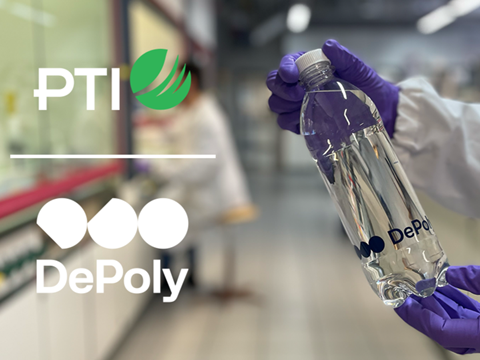
Utilizing a ‘broad spectrum’ of PET and polyester feedstock, DePoly and Plastic Technologies Inc. (PTI) have produced a ‘closed-loop’ recycled PET bottle suitable for food contact and long-term storage.
This process involves sourcing raw, ‘virgin-grade’ purified terephthalic acid (PTA) monomers from PET and polyester in a mixed stream of feedstock, including packaging, fibres, insulation, and other industrial waste, using DePoly’s ‘versatile and adaptable’ technology.
These monomers are then rebuilt into PET pellets, which in turn undergo injection stretch blow moulding to become recycled PET bottles – a method that utilizes PTI’s knowledge and technology.
Recycled PET bottles are reported to be one of the most challenging end products to create, and alongside bottle sampling, a preliminary screening analysis of non-intentionally added substances (NIAS) in DePoly’s rPET material suggests that it meets the migration requirements for food-contact PET in long-term storage at room temperature and below, including hot fill.
As such, DePoly’s technology hopes to ‘pave the way for a new standard in the industry’.
“For this project we really wanted to challenge ourselves, taking a mixture of different PET- and polyester-containing waste streams that are blended and have different additives,” explained Dr. Gaetano Dedual, senior business development manager at DePoly. “Being able to hold this bottle in my hands is a testament to DePoly’s and PTI’s ingenuity and expertise!”
“We did not really know what to expect from this first processing and prototyping trials with DePoly’s chemically recycled material,” added Stéphane Morier, director Project Management at PTI. “For a premiere, the outcome is promising. With PTI’s technical expertise, the prototyping went well and the quality and performance of the produced samples are similar to a control made from a virgin PET resin!”
rPET bottles are becoming more widely utilized across the packaging industry, with Coca-Cola previously unveiling 100% rPET 500ml bottles in Hong Kong. Originally, the move fell in line with its target to offer 100% recyclable packaging by 2025 and incorporate 50% recycled material across its packaging lines by 2030, but these have since been revised; now it targets 100% recycled packaging by 2035, and to use between 35% and 40% recycled material in its primary plastic, glass, and aluminium packaging within the time frame.
However, rPET is also gaining traction in wine bottle applications. Aldi and Packamama’s ‘flat’ wine bottles are made entirely from rPET and claim to be seven times lighter than glass, as well as facilitate easier storage; while ALPLA’s recyclable wine bottle offers an entirely rPET version and expects to save energy, materials, and carbon emissions during production.
If you liked this story, you might also enjoy:
Reuse vs. single use – which is better for the environment?
Sustainable Innovation Report 2025: Current trends and future priorities
What can the world learn from South Korea’s world-leading performance in plastics circularity?














No comments yet